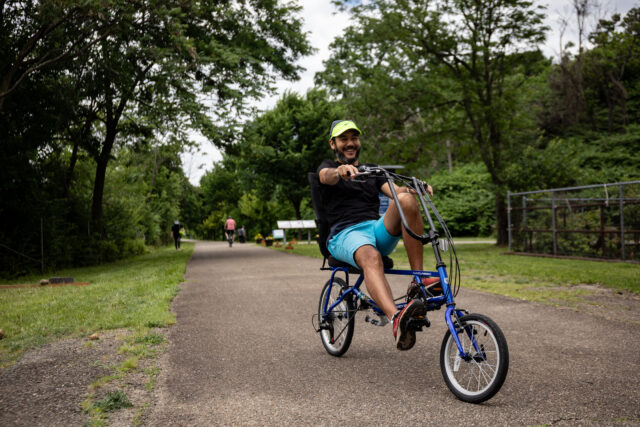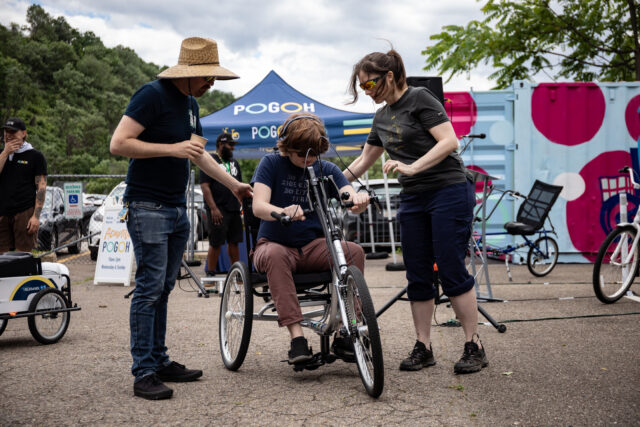Adaptive Bike Share Officially Launches in Pittsburgh
by Odochi Akwani, Writer and Content Manager
July 2, 2024
After months searching for a spot to house their fleet of seven unique bikes, Adaptive POGOH found its home.

Last fall, Bike Share Pittsburgh — also known as POGOH — first showcased its fleet of adaptive bikes at two pop up events to let the community test out their newly acquired rides and solicit feedback. After that, the adaptive program was on hold until recently when a permanent location on Eliza Furnace Trail was secured and the program pilot officially launched on May 29.

Photos courtesy of POGOH from their launch event
“We had dreamed up Adaptive POGOH, got all the cycles, and then we were struggling to finalize a location, a home for it,” says Erin Potts, POGOH’s director of marketing and community outreach. “The pop ups really allowed us to get out there and get people excited about it, but we definitely knew we needed a permanent home for this program and more reliable hours and days of operation so that we could intentionally reach the people that we’re trying to reach with this program.”
Adaptive POGOH is open every Wednesday and Sunday from 10 a.m. to 2 p.m. Bikes are located at the beginning of the Eliza Furnace Trail section of the Three Rivers Heritage Trail in Downtown Pittsburgh. The adaptive bikes are free to rent and the fleet includes a recumbent bike, a tandem bike, a hand cycle, a cargo bike, an adult tricycle, a low step-through bike, and a side-by-side adult tricycle. They can be reserved online or walk-up reservations are allowed on a first-come, first-served basis.
Since launching, dozens of folks have rented out the adaptive bikes, including Pittsburgh resident Renee H. who has been riding the recumbent bike. This program is the reason she’s been able to bike again since a head injury led to vertigo and balance problems.
“For me, to be able to be on this bike a couple years after my injuries was so freeing. I called both my kids while I was on the bike, crying, saying ‘I have wind in my hair,’ Renee says. “There’s an array of bikes for people with many different limitations.”
River trail access was important for POGOH when deciding on a location, according to Potts, since the trails are flat, well-maintained, and paved. Additionally, Joy Riders, one of POGOH’s partners that operates its own fleet of adaptive wheelchair cycles, highlighted how folks often want to ride alongside those on the adaptive bikes. With this in mind, POGOH positioned itself next to one of its bike share stations.
“We don’t mandate that people stay on the trail, but from feedback that we heard from other cities with these programs, people tend to want to use them more recreationally. They want to explore in a safe and low-stress environment,” says Potts. “So, we wanted to have something that was on the trail and accessible to relatively flat areas of Pittsburgh.”
Potts says POGOH staff talked with MoGo in Detroit and Adaptive BIKETOWN in Portland to understand what best served their adaptive bike users in terms of setup and took those insights into account when building their own program. They also had the chance to see Hamilton Bike Share’s adaptive bike program during the 2023 North American Bikeshare and Scootershare Association (NABSA) conference.
“We were very fortunate to go to NABSA in Hamilton, Ontario, last year, and many of us had the pleasure of getting to visit their facility, test some of their adaptive fleet, and see their setup and how they operate out of an alternative site that’s not at an office space,” says Potts. “We were learning tidbits along the way and trying to get as much feedback as we could to make sure that we were launching this in a way that worked in other cities.”
POGOH is utilizing their Pittsburgh Bike People program as a way to get the word out about the new adaptive program. Pittsburgh Bike People launched last year as an “inclusive biking community through a shared outreach team” through a partnership between POGOH and BikePGH. The group attends more than 100 community events each year according to Potts. In order to build new connections, the system is reaching out to senior centers and advocacy groups on behalf of people with disabilities.
“We see them as a group that can talk about all things cycling in Pittsburgh. No matter where you’re coming from, where you’re at, how you ride, or even if you’re not riding yet — we want this team of people to be at community events throughout the city talking to folks about what there is out there for them in terms of cycling,” says Potts.
With the pilot program ending on September 29 later this year, POGOH is looking for ways to make Adaptive POGOH a sustainable enterprise and remain free in the future.
“We would love to have more of a dedicated staff for this. Right now, it really is just a passion project for everyone who works at the bike share, and we are all chipping in to get this thing rolling,” says Potts. “It’s identifying funding so that we can grow this thing and make sure it’s open more, and there’s staff that’s dedicated to serving this community on a regular basis.”
